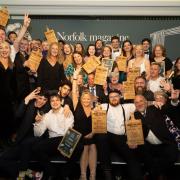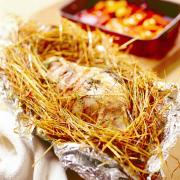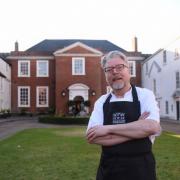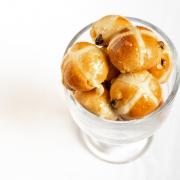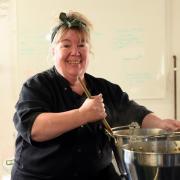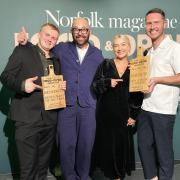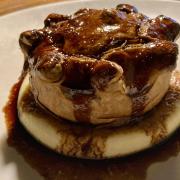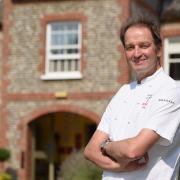Did you know some of the berries that go into one of the nation’s best-loved drinks are grown in East Anglia?

When Rosie Begg was a teenager, she’d spend long summer hours on the back of a blackcurrant harvester as it trundled along, collecting the family farm’s crop of fat berries. It wasn’t an experience that filled her with great joy.
So when she turned 18 and headed off to university in Exeter, she probably thought that she’d seen the last of these sharp little fruits. How wrong she was.
Because, after trying her hand at finance, marketing and PR in London, she found the pull of her home county too strong and is now back at Gorgate Hall Farm near Gressenhall directing operations and growing, yes, blackcurrants – hundreds of tonnes of them for the makers of one of the nation’s favourite drinks, Ribena.
“I’d drifted between jobs, not finding what my passion was,” she says. “Friends would say ‘you know you will ultimately move back to the farm’ and I’d say ‘no, that’s not it’.”

But it was ‘it’. This is her second year and, all being well, her crop of little black beauties will be picked this month and dispatched to be pressed and processed. But the 30-year-old has had a tough introduction to the business.
The combination of a very wet late winter and a dry spring - including the sunniest May on record - has been a particular challenge. “Last year I was told ‘you could not have started on a worse year!’
At that first harvest, says Rosie, there was a real mis-match of fruit. “Some had fallen off the bush, some were black and looked great, some were red, some green... you basically had a rainbow in your hand! It made it hard to know what to do.
“Then this year has come along... I think you have got to accept that this is the reality of the climate now and we have got to start to think differently about things,” says Rosie, philosophically.

Despite the tough start she is up for the game and passionate about it. When we talked she had been out in the fields helping to finish the hand-hoeing of around seven hectares of bushes. “Definitely a labour of love!” she says, adding that the new bushes, replacing old stock, would normally be in the ground in February but wet weather meant it was April before they were planted.
Blackcurrants have been grown at Gorgate for almost 70 years and Rosie’s late father, Brian Cross, became involved when he bought a farm which came with a Ribena contract. He had to learn the ropes, just as his daughter has.
Rosie believes that what sets her apart from other growers and farmers is that she comes with no real experience behind her, is prepared to innovate and use technology and data to inform her decisions and, crucially, is not afraid to ask for help.

Do you remember going strawberry picking in Norfolk?
“I’m very honest when I speak to people and will say ‘I’m sorry, I don’t have the knowledge or experience’,” she says. “And I am asking questions like – why have we done things this way for the last 20 years? Because it’s right for our farm or because we’ve always done it this way?”
Her involvement with Ribena has also given her access to a select group of fellow growers both in the county and the country in The Blackcurrant Foundation. “The Blackcurrant Foundation has been so brilliant because it is basically like having 30 mentors. I can call and say ‘what have you done about this?’ or ‘do you have a problem with this’? and I have been so fortunate because I have been so welcomed; everyone is so willing to help you and they are more than happy to share their knowledge.”
Rosie is keen on developing ideas around technology, like using sensors to monitor the moisture levels around the plants to help plan investment in irrigation, and digging deep into data, with the help of husband Alex, for the farm’s long-term strategy. She is currently experimenting with feeding the crop an ‘energy drink’ using glucose.
But she is also devoted to the notion of sustainable farming and using nature to help achieve her goals. “I love the blackcurrants but equally I love the fact that we have the opportunity to really boost our bio-diversity here,” she says.
She has submitted an application for the higher tier countryside stewardship scheme, under which farmers and land managers are paid for effectively managing their land in a way which protects and enhances the environment and wildlife, and is part of the Upper Wensum Cluster Farm Group which works to improve soil and water quality over more than 10,000ha of land.
She has tried using plants to discourage pests, including planting yarrow to discourage snails, though that didn’t go quite as well as hoped. “The snails seemed to quite like it!” says Rosie.
Other ideas include penning in runner ducks to eat unwelcome visitors and using grazing animals instead of machinery to keep the grass between the rows of blackcurrants short. “We are definitely only at the beginning of the journey. It’s a very steep learning curve,” she says.
She is comfortable working in a world still traditionally dominated by men. “You do have the odd comment ‘are you in marketing?’ but I am proud to be able to say no, actually, I’m a farmer just like you.”
Does she ever get tired of blackcurrants? “No!” she laughs. “We freeze them and have them most days of the year – you can have them in so many different ways, as a smoothie, or blackcurrant jelly to go with meats or on toast, and as lots of different desserts. I love them.”
More great Norfolk living on our Facebook page.







